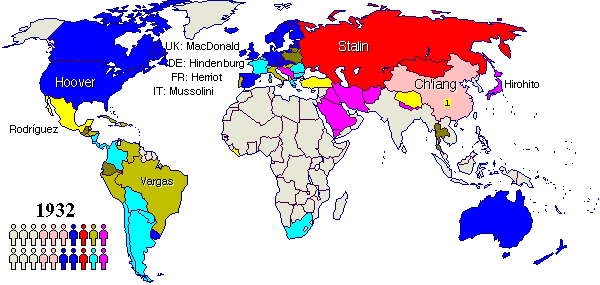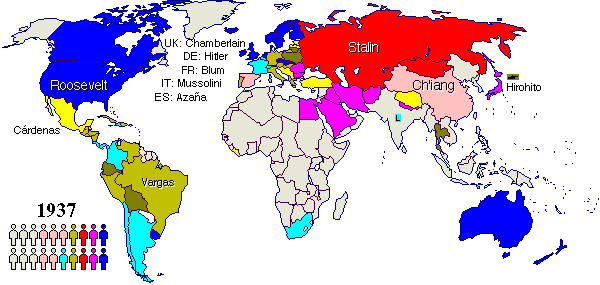


![]()
![]()
When the global economy collapsed in 1929, the older, established democracies rode out the crisis by instituting subsidies and unemployment relief programs, but in nations with shallower democratic roots, the global slump kicked out the underpinnings of liberal democracy and destroyed its credibility. As the voters turned toward parties with more radical agendas, the number of democracies in the world plummeted as quickly as the economic indicators. For a time it was uncertain whether nations like Germany would swing hard left or hard right, but when it came down to choosing sides, the right wing offered the most and made fewer demands. They promised full employment, consumer gratification and a golden age of national unity of purpose -- just like the Communists -- but without denouncing God, Homeland and private property. The corporate and military elites supported the Nazis as did a plurality of the voters, so in 1933, Adolf Hitler became chancellor of Germany.
For awhile, the Western democracies themselves had difficulty deciding whether the hard right or left was the greater danger to civilization. Then, in 1936, the Spanish right wing rose against the democratically elected leftist government, and Fascism lost most of its respectability worldwide.
Across Asia and North Africa, in the old heartlands of civilizations, there where hints that the old era of imperialism might be coming to an end. In 1932 and 1936, the British set the ancient nations of Iraq and Egypt free, while they also arranged a larger measure of self-government for India in 1935 after a mass protest campaign orchestrated by Mohandas Gandhi. With the 1931 Statute of Westminster, the UK reorganized the Empire into a newer Commonwealth which granted independence to the dominions. The Americans meanwhile set up an autonomous Commonwealth of the Philippines with the passage of the Tydings-McDuffe Act in 1934.
Unfortunately, there were plenty of younger countries which had missed out on the 19th Century frenzy of conquest and had now decided to make up for lost time; however, timing is everything. It was not considered appropriate for them to begin a new round of empire-building now that the civilized world was turning away from that sort of thing, so when Japan invaded Manchuria (1931) and Italy invaded Abyssinia (1935), the rest of the world loudly (but impotently) condemned them. Then Germany started to carve a new empire out of smaller European neighbors (Austria, Czechoslovakia: 1938), but it wasn't until the third nation (Poland: 1939) was overrun that the Western Powers bit the bullet and declared war.
![]()
Last updated February 2000
Copyright © 2000 Matthew White